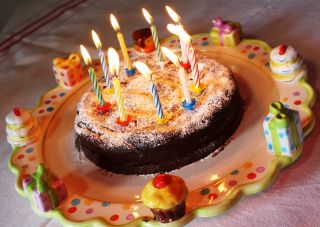Diet
Celebrating Healthy Birthdays
Chocolate-almond birthday cake: both delicious and nutritious
Posted October 22, 2012

For many people who have survived cancer, birthdays take on a whole new meaning. They’re not just an occasion to celebrate their birth, but also a chance to give thanks that they’re still alive – sometimes, against poor odds.
Many people mark not only their own birthday, but also the milestones along their cancer journey that some dub “re-birthdays”. The American Cancer Society (“The Official Sponsor of Birthdays”) recently asked its Facebook followers how they determine a “cancer-free birthday.” Of the 350-odd responses, more than half fell into the four following categories:
- Day of diagnosis – “It’s the day my life changed forever, so we celebrate it,” wrote Elizabeth Bianchi.
- Day of a doctor declaring them “all clear” – “That was a great day for me!” wrote Gina Bain. “I had the pink ribbon tattooed in the upper part of my ear.”
- Day of a key procedure, such as a surgery to remove cancer – Donna Huckeba Rice chose “the day my cancerous (breast) was removed from my body! God has blessed me with wonderfully great health since! Cancer free since 3/4/2003!”
- Day of Final treatment – “July third 1986,” wrote Caroline Johnson Cozzi. “Leiomyosarcoma left hip. NED (no evidence of disease status) 26 years! I thank God, Bethesda Naval Hospital and the National Institutes of Health!”
Many Facebook respondents said they couldn’t pick a day. There are simply too many good ones. “Celebrate every day!!” says Betsi Skolaris. “That solves your problem!”
For the nearly 12 million cancer survivors currently living in the U.S., staying healthy and celebrating as many birthdays as possible is the number-one goal. And while some people just want to forget that cancer even happened to them and get back to “business as usual,” many more are keen to do whatever it takes to reduce their risks of their cancer returning, or a different one developing.
There aren’t yet a lot of long-term studies showing the most reliable ways of preventing cancer recurrence, but research indicates that lifestyle habits which lower the risk of cancer developing in the first place may also reduce the chances of its recurrence. These include natural, nutrient-rich diets, regular physical activity, stress-management techniques and avoiding exposure to toxins from cigarette smoke, charred or processed meats and environmental pollutants.
Earlier this year a panel of experts convened by the ACS published an excellent in-depth report evaluating the scientific evidence related to optimal nutrition and physical activity for cancer patients and survivors. In the nutrition section the report encourages dietary habits closely resembling those of the traditional Mediterranean diet we recommend here: rich in vegetables and fruits, eschewing sugar and refined grains and including fish and nuts, seeds and legumes.
Today we’d like to join the ACS’s birthday-sponsorship efforts by contributing this birthday-cake recipe. In keeping with the ACS guidelines for low-sugar, nutrient-dense foods, this cake contains dark chocolate (rich in antioxidant and anti-inflammatory compounds), olive oil (ditto), almonds (blood-glucose-balancing, weight-loss promoting and an excellent source of antioxidant vitamin E), eggs delivering high-quality protein (and omega-3 fats, provided the hens were fed omega-3-rich feed) and is sweetened with acacia honey (which has a modest impact on blood glucose). It’s gluten- and dairy-free, contains no refined grains or sugary icing, and tastes deeply chocolaty and satisfying.
Another reason to look forward to your next birthday!
Queen of Sheba Chocolate Cake (from Zest for Life, The Mediterranean Anti-Cancer Diet)
Served with raspberry or strawberry coulis, this luxurious, rich-yet-light French classic, Gâteau Reine de Saba, makes the perfect dinner-party dessert. Adorned with candles and chocolate sprinkles, it doubles as a delicious gluten-free birthday cake (double the recipe for a family-sized cake). Makes one 9-inch/23-cm cake (gluten-free).
4.5oz/125g dark chocolate (70% cocoa content or more)
6 tbsp fruity olive oil (or 3 tbsp olive oil and 3 tbsp butter for a lighter flavor)
2 tbsp strong espresso coffee (optional)
4 eggs, whites and yolks separated
2-3 tbsp acacia honey
1 tsp natural vanilla extract
3.5oz/1¼ cups/100g ground almonds or hazelnuts
1 tsp pure cocoa powder or icing sugar
Preheat oven to 350°F/180°C. Line the bottom of a 9-inch/23-cm cake tin with greaseproof paper and lightly rub the sides with butter.
To melt the chocolate, break it into small pieces and place in a glass or metal bowl with oil, butter and coffee (if using the latter two). Boil 1 pint/500ml of water and pour carefully into a larger bowl. Set bowl containing chocolate on the hot water and stir until it has melted into a smooth, velvety liquid. Remove and set aside to cool.
In a large mixing bowl, beat egg whites with an electric whisk until firm. In another bowl, whisk egg yolks and honey until frothy, add chocolate-butter-oil mixture and combine. Add vanilla extract and ground almonds or hazelnuts and whisk into a smooth batter.
Now gently fold in the beaten egg whites, taking care to lift rather than stir them into the batter so that it remains light and airy. (If you are unsure how to do this, here’s a video that shows how to fold beaten egg whites into batter: http://www.youtube.com/watch?v=vP4vbktd-PM&feature=related.) Pour batter into cake tin and bake for 30 minutes, or until risen and slightly cracked on top.
Remove cake from oven, cool for 5 minutes in the tin and then turn out onto a cooling rack. Once cooled, transfer to serving plate and dust lightly with dark cocoa powder or confectioner’s sugar.




